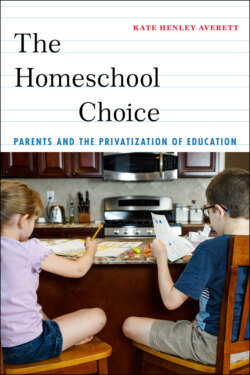The Homeschool Choice

Реклама. ООО «ЛитРес», ИНН: 7719571260.
Оглавление
Kate Henley Averett. The Homeschool Choice
The Homeschool Choice. Parents and the Privatization of Education
Contents
Introduction
School Choice and the Privatization of Education
Childhood Gender and Sexuality
Mothering and Gender Inequality
The Study
Why Texas?
Roadmap of the Book
1. Homeschooling in the United States. A Brief Overview
The Emergence of the Modern Homeschooling Movement
Controversy and Legalization
Current Homeschooling Regulations
Homeschooling Instruction
Homeschooling Outcomes
Current Trends: Who Homeschools?
Conclusion
2. What Is Childhood? Contrasting Views of Childhood Gender and Sexuality
Childhood Gender and Sexuality
Childhood Gender and Sexuality in Parents’ Motivations for Homeschooling
Critique #1: School as Overly Sexual
Critiques of Curricula
Concerns about Peer Influence
Children as Innocent
Sexual Morality: Behavior over Identity
Critique #2: School as Constraining Gender and Sexuality
Critiques of Curricula
Concerns about Peer Environment
Children as Autonomous
Gendered and Sexual Beings: Identity over Behavior
Conclusion: Are Children “Born This Way”?
3. Educating the Unique Child
Homeschooling as a Solution to Children’s Unique Needs
Temperaments
Aptitudes
Disability and Special Needs
Giftedness
Interests
Personal Needs
Conclusion: Changing Conceptualizations of Childhood in the United States
4. Views of Education. What Do Children Need out of an Education, and Who Should Provide It?
School Choice and Neoliberal Education Reform
Bullying and Student Safety
Quality of Education
DIY Education and Deskilling of the Teaching Profession
Conclusion: Homeschooling and School “Choice”
5. Giving Up on Government
Americans’ Perceptions of Government
Schools as Extensions of the State: Perceptions of the Political Agendas of Schools
The Conservative Critique: The Government’s Anti-Christian Agenda
The Liberal Critique: The Government’s Anti-Education Agenda
Support for Schools as Ideological Sacrifice
The Inefficacy of the State
Federal Government Overreach: Critiques of Federal Education Reforms
Conclusion: Are Homeschoolers and Government Natural Adversaries?
6. Motherhood and the Gendered Labor of Homeschooling
Homeschooling Labor and Intensive Mothering Ideology
Homeschooling as Mothers’ Work
Homeschooling as an Extension of Mothering Philosophies and Practices
Gender Essentialism: Breastfeeding, Attachment Parenting, and Intensive Mothering
Parenting under Patriarchy
Homeschooling, Heteronormativity, and Neoliberal Motherhood: Implications for Gender Inequality
Neoliberal Motherhood: What’s Best for My Kid
Conclusion. Is Homeschooling a Problem?
Is School Choice a Problem?
Implications of School Choice for Racial and Class Inequality
Implications of School Choice for Gender, Sexuality, and Children’s Rights
Conclusion
Acknowledgments
Appendix. Methodology. Study Design: The Uses of Mixed Methods for Researching Understudied Groups
Positionality and Access to the Homeschooling Community
Issues of Trust in Studying the Homeschooling Community
Notes. Introduction
Chapter 1. Homeschooling in the United States
Chapter 2. What Is Childhood?
Chapter 3. Educating the Unique Child
Chapter 4. Views of Education
Chapter 5. Giving Up on Government
Chapter 6. Motherhood and the Gendered Labor of Homeschooling
Conclusion
Appendix
Bibliography
Index
About the Author
Отрывок из книги
Critical Perspectives on Youth
General Editors: Amy L. Best, Lorena Garcia, and Jessica K. Taft
.....
Even if you talk to a child, and prep them, and encourage them, and send them out into a public-school setting, they’re going to make mistakes. They’re going to. I think the pressure is quite a bit, and it’s for such a long period of time. It’s a long period of time to make the right choices, you know, to do things, or to not do things that would be wrong, in your parents’ eyes. And even for adults—you’re in the workplace, you find yourself listening to a joke that you know you shouldn’t listen to, and then, not even calling the person out, “Hey, that’s completely inappropriate.” So it’s not specific to age; it’s just one of those across-the-board type of things that is just a people thing. And it takes practice, to make those right decisions and stand firm in what you believe. That takes practice.
Claudia felt that the temptation to think and behave in ways that are morally wrong was not exclusive to children, but she believed that children have the added disadvantage of not having enough practice in making “right decisions.” Claudia saw homeschooling as a way to prevent her children’s thoughts and behaviors from going in the “wrong,” or morally unacceptable, direction.
.....